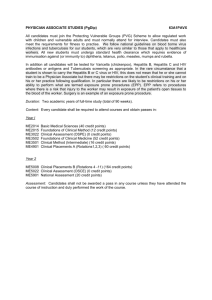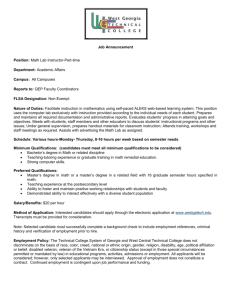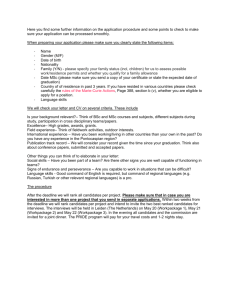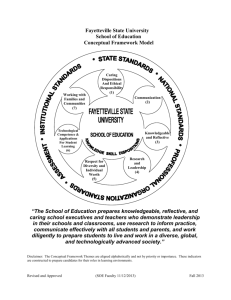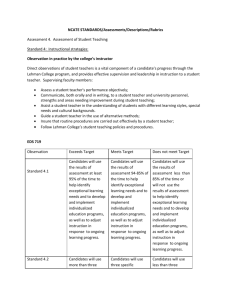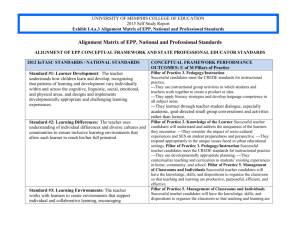4.3.b.1 Bethel University School Education Conceptual Framework
advertisement
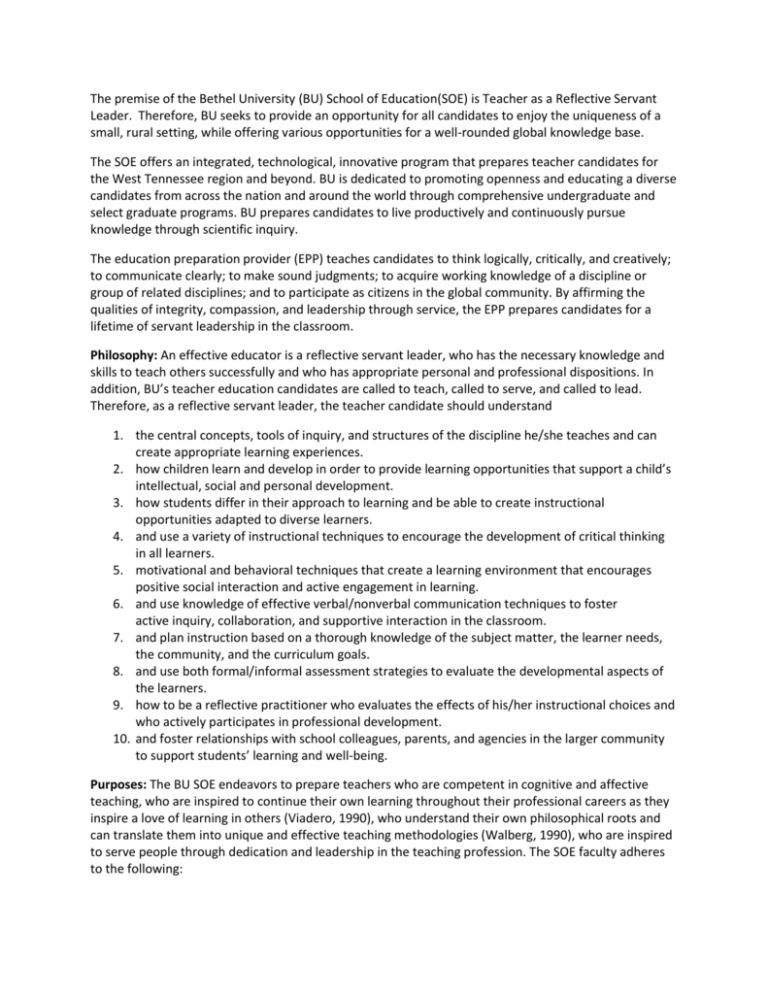
The premise of the Bethel University (BU) School of Education(SOE) is Teacher as a Reflective Servant Leader. Therefore, BU seeks to provide an opportunity for all candidates to enjoy the uniqueness of a small, rural setting, while offering various opportunities for a well-rounded global knowledge base. The SOE offers an integrated, technological, innovative program that prepares teacher candidates for the West Tennessee region and beyond. BU is dedicated to promoting openness and educating a diverse candidates from across the nation and around the world through comprehensive undergraduate and select graduate programs. BU prepares candidates to live productively and continuously pursue knowledge through scientific inquiry. The education preparation provider (EPP) teaches candidates to think logically, critically, and creatively; to communicate clearly; to make sound judgments; to acquire working knowledge of a discipline or group of related disciplines; and to participate as citizens in the global community. By affirming the qualities of integrity, compassion, and leadership through service, the EPP prepares candidates for a lifetime of servant leadership in the classroom. Philosophy: An effective educator is a reflective servant leader, who has the necessary knowledge and skills to teach others successfully and who has appropriate personal and professional dispositions. In addition, BU’s teacher education candidates are called to teach, called to serve, and called to lead. Therefore, as a reflective servant leader, the teacher candidate should understand 1. the central concepts, tools of inquiry, and structures of the discipline he/she teaches and can create appropriate learning experiences. 2. how children learn and develop in order to provide learning opportunities that support a child’s intellectual, social and personal development. 3. how students differ in their approach to learning and be able to create instructional opportunities adapted to diverse learners. 4. and use a variety of instructional techniques to encourage the development of critical thinking in all learners. 5. motivational and behavioral techniques that create a learning environment that encourages positive social interaction and active engagement in learning. 6. and use knowledge of effective verbal/nonverbal communication techniques to foster active inquiry, collaboration, and supportive interaction in the classroom. 7. and plan instruction based on a thorough knowledge of the subject matter, the learner needs, the community, and the curriculum goals. 8. and use both formal/informal assessment strategies to evaluate the developmental aspects of the learners. 9. how to be a reflective practitioner who evaluates the effects of his/her instructional choices and who actively participates in professional development. 10. and foster relationships with school colleagues, parents, and agencies in the larger community to support students’ learning and well-being. Purposes: The BU SOE endeavors to prepare teachers who are competent in cognitive and affective teaching, who are inspired to continue their own learning throughout their professional careers as they inspire a love of learning in others (Viadero, 1990), who understand their own philosophical roots and can translate them into unique and effective teaching methodologies (Walberg, 1990), who are inspired to serve people through dedication and leadership in the teaching profession. The SOE faculty adheres to the following: The professional education of candidates: 1. must be holistic in nature encompassing the goals of the university and the objectives of the education program (Cove & Love, 1996). 2. requires the concerted efforts of all BU candidates, faculty, and public school personnel. 3. must encompass the study of the general development of children, including learning theories in cognitive, affective, psychomotor, and social domains. 4. requires classroom and clinical practice with general and pedagogical studies (Brookhart, 1999). 5. requires attention to established and current research-based methodologies. 6. must develop a well-educated person with general knowledge of a variety of subjects as well as training in a specific subject area. Professional education promotes the desire to continue to learn and develop through reflective teaching, collaboration, staff development, and continuing education in the changing context of professional development (Mundry & Loucks-Horsley, 1999). 7. includes the study of ever changing educational technology. 8. must provide them with appropriate communication skills to work effectively in the profession and in their private lives. 9. must emphasize that effective professional practice requires continuous and lifelong growth and development. Professional educators practice model-based instruction in the current research based instructional strategies. 10. requires practicing model-based instruction utilizing current research based instructional strategies. In the teacher education program (TEP), the EPP emphasizes teachers’ professional obligations to make contributions of leadership. Candidates begin to develop a sense of commitment by participating in a variety of activities: membership and community service in the Bethel Education Association of Student Teachers (BEAST), making presentations in public schools, and assisting local classroom teachers. The BU SOE emphasizes service to others throughout all university programs. TEP embraces and promotes the concept of community service in its courses and experiences. To fulfill the expectations of and find fulfillment in this profession, a teacher must continue to grow as a well-educated, wellrounded, and well-adjusted person. The need for intellectual, physical, social, emotional, and spiritual growth continuously evolve. The EPP promotes critical thinking, uses technology as a vehicle for modeling current best practice, engages candidates in service learning and the pursuit of civic responsibility, prepares professional educators to interact effectively with culturally diverse populations, and involves candidates in the utilization of collaboration to promote learning and teaching through scientific inquiry.
